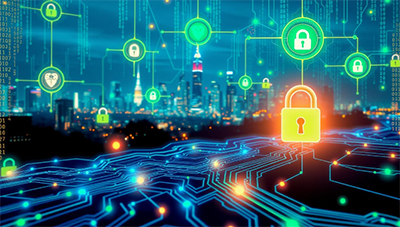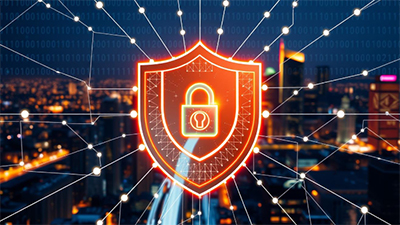

Essential Online Security Tips
In today's digital world, online security is more crucial than ever. Cyber threats are on the rise, making it vital to protect your digital identity. Did you know cyber attacks have grown by 38% in the past year? This shows how important it is to stay aware and proactive.

Digital safety is not just for tech experts. It's a concern for everyone who uses the internet. Whether you're a casual browser or a business professional, knowing the basics of internet protection is key. A recent survey found that 76% of people are now improving their online security.
Using strong passwords is a crucial part of cybersecurity. Only 43% of users use a password manager to secure their accounts. This simple tool can greatly enhance your digital safety. Another effective step is enabling two-factor authentication, with 68% of Google Account users now using it for extra protection.
As we explore online security further, we'll look at practical tips and strategies. These will help you stay safe while browsing, shopping, or working online. Follow these essential guidelines to navigate the digital world with confidence and peace of mind.
In today's digital world, cybersecurity is key to keeping our online lives safe. The spending on cybersecurity worldwide is set to hit $188.1 billion in 2023. This shows how important it is. Let's dive into what makes this field so crucial.
Cybersecurity is all about keeping our digital world safe. It uses practices and technologies to protect our networks, devices, and data from harm. It covers many areas, like keeping apps, cloud services, and infrastructure secure.

Keeping yourself safe online is key today. Strong passwords are the first step. Don't pick easy ones like "123456" or "password." Use unique, complex passwords for each account. A password manager can help you keep them safe.
Adding multi-factor authentication is a smart move. It asks for more than just a password. This makes it harder for hackers to get into your accounts.
Good browsing habits are important. Be careful with links and downloads from unknown places. Use secure Wi-Fi and consider a VPN for extra safety. Always update your software to fix security holes.
Back up your data regularly. Follow the 3-2-1 rule: have three copies, use two different storage types, and keep one offsite. Cloud services make offsite backups easy. Remember, wiping a computer completely is key to keeping data safe. For really sensitive stuff, use the "DOD wipe" method.
Know about phishing and report any weird stuff. By following these tips, you'll make your online world much safer. You'll protect your digital self too.
There are many dangers online. Malware can harm devices and steal our data. Phishing scams try to get us to share personal info. Ransomware attacks have grown by 13% in five years, costing an average of $1.85 million per incident.
Small businesses are especially at risk. In the past year, 13% of them faced a ransomware attack.
Data breaches can be very damaging. In 2020, the average cost for small businesses in the U.S. was $3.86 million. These breaches can also harm a company's reputation. If personal data is leaked, 50% of consumers might stop using the company's services.
Cyberattacks can disrupt business operations. This can hurt investor and partner trust.
In today's world, keeping your devices safe is key. People under 60 are more likely to lose money online. This shows how important mobile safety is.
Only half of us use security software on our phones. Yet, we use them for many financial tasks. This is a big risk.
Smart home security is also vital. Always change default passwords on IoT devices. Keep their firmware up to date. Be careful when using public Wi-Fi.
For online shopping, check if websites use "https" in their URL. Hackers can try up to 10 billion passwords in seconds. This is why security is so important.
IoT security goes beyond phones. Check and update security settings on all devices and accounts. Use strong, unique passwords and change them every 60 days.
Install system updates quickly. They often fix important security issues. The WannaCry ransomware attacked over 200,000 computers worldwide because of uninstalled patches.
Be careful with what you share on social media. Adjust your privacy settings. Regular credit checks can spot fraud.
If you think your identity has been stolen, there are resources to help. Consider freezing your credit or setting up fraud alerts for extra protection.
|
|
FEATURES & ARTICLESVISIT OTHER EMIRATESInteresting Links ONLY webinars 4.0 Revolution International Humanitarian City Dubai Restaurants Guide Corporate Gifts Middle East News |